Effective keyword research identifies important terms, phrases, questions, and answers for your website visitors and consumers. Additionally, your keywords should serve SEO objectives such as increasing pageviews, acquiring leads and selling products and services.
Did you know Google receives around 5.6 billion keyword queries every day? If you want to find your target customers out of those billions of searches, you must choose the right keyword. Effective SEO keyword research sets the foundation for an effective, foundational marketing strategy. This guide explains what exactly is keywords research, why is it important and how it is performed.
What is Keyword Research?
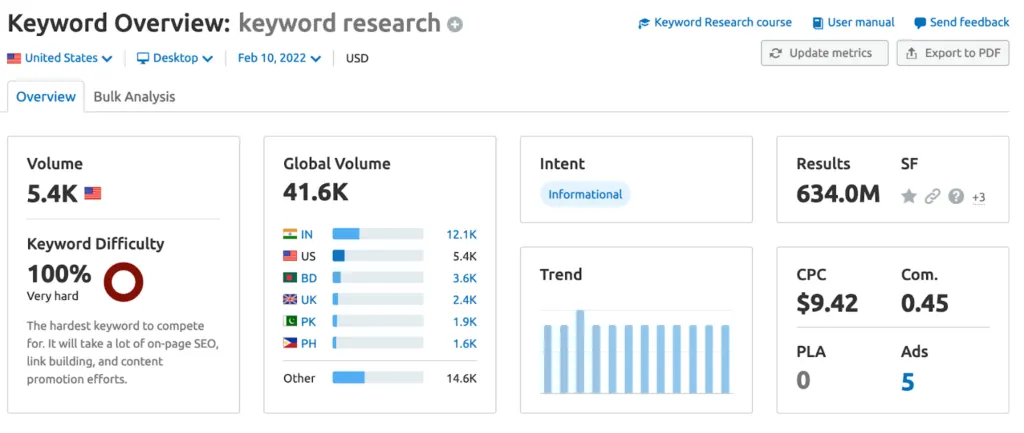
Keyword research is a technique that enables you to discover popular search terms. These are the terms that users enter into search engines such as Google, Bing, and Yahoo (among others) to find specific services like yours. These keyword suggestions are strategically used in your on-page SEO marketing strategy to be heard, seen, and liked. The relevant keywords can improve your online visibility and bring you more customers.
Why Keyword Research is Important?
Effective keyword research also helps you to reach the right kind of customers. It simplifies your marketing campaigns and builds a foundation for success. At NSDS, we create a data-driven on-page content strategy for our clients that focuses on bringing them the right traffic. We first determine our clients’ target audience and the kinds of keywords they use to find services like those our clients’ offer. We use these keywords to create content that resonates with both search engines and visitors to attract more visitors to a site and ultimately generate better sales for our clients.
Keyword research reveals the targeted queries your competitors are ranking for, as well as all the target keywords for which you are not ranking. Any search term that fits into both categories is likely to be a strong candidate for your target list of keywords (but not always). Looking at your competitors’ strategies helps you to fine-tune yours and improve your online visibility.
Effective keyword research can help you reach your potential customers easily. According to Ahrefs, 90.63% of web pages don’t get any traffic from Google because they focus on the content that nobody is searching for. Many business owners make the mistake of creating content without keyword research. Creating content focused on the right keywords gets you in the best listings of search engines.
Additionally, keyword research gives direction to your marketing campaign. It enables you to answer the questions such as “how difficult will it be to rank for a phrase?” or “how much traffic I am likely to get if I rank for a keyword?” Finding the answers to these questions can help you choose the right keywords for search engine optimization efforts.
At NSDS, our data-driven keyword research enables us to help clients attract the right kind of traffic to their websites. One of our long time clients has seen a steady increase of up to a thousand hits per month due to solid on-page and off-page SEO. Both their impressions and their Click through rates have seena steady increase over the past 2 years. This was achieved with both on-page content development, a solid blogging strategy and other off-page SEO services.
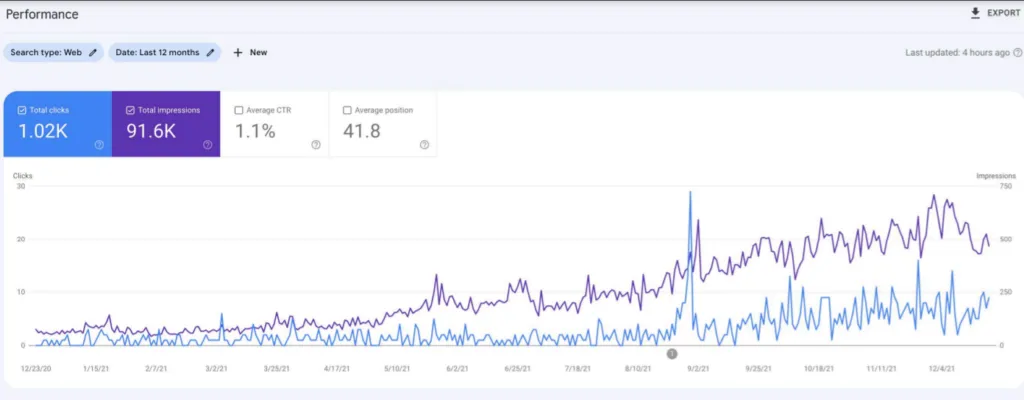
Similarly, another client (a CT-based Law Firm) has started ranking for their target keywords within days after their website was relaunched in January of 2022. For this client, we leveraged competitor analysis and keyword research to create 3 custom service pages and an optimized homepage. The client was also delivered a base level DIY backlinking strategy which included tips on how to maximize their Google Business Profile.
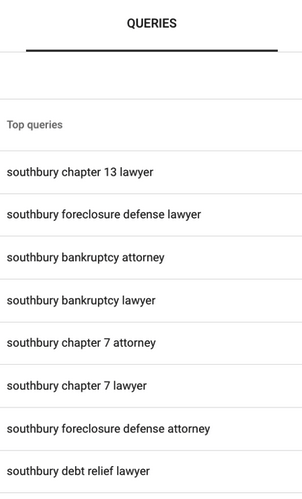
How to do the Keyword Research?
1. Make a List of Broad Ideas
The process of keyword research starts with making a list of broad ideas or topics about your business. One way of doing it is through Google suggest queries. When you type in a keyword into the Google search bar, a list of relevant keyword ideas appears. For example, if you type the keyword probate attorney into the Google search bar, you find out the following autosuggest keywords.
- Probate attorney, estate planning Connecticut
- Probate attorney Vs. probate
- Probate litigation
- Probate attorney meaning
- Probate attorney fee
- Probate Attorney Los Angeles
- Probate attorney Las Vegas
- Probate attorney Dallas
If you are a probate attorney in Connecticut, your relevant keywords could be “Probate attorney, estate planning Connecticut,” “probate attorney Vs. probate” or “Probate Litigation.”
2. Find out the Keywords with the Highest Potential
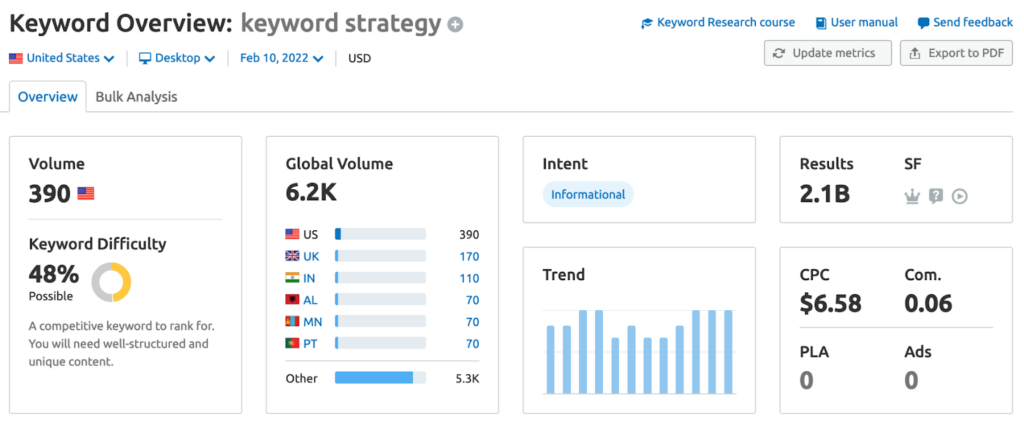
The second step involves choosing the best possible keywords by applying filters for keyword metrics. To find out these metrics, we can choose a premium keyword research tool like Ahrefs, SemRush, Moz Keyword Explorer, or Google Ads Keyword Planner.
These keyword metrics include search volume, keyword difficulty, keyword competition, clicks, etc. It is also important to note that only finding the keyword with the highest search volume is not the right strategy. You should also focus on the keywords with low competition or low keyword difficulty scores so that you could rank for those. This ensures that you are competing against less number of competitors when you are trying to rank for a keyword. Also, you do not require a lot of backlinks to rank for that keyword.
Another way of narrowing down your list of target keywords is by browsing through forums like Reddit, Quora, Youtube, or Facebook. This is where your target customers are trying to find the answers to their pain points. Browsing through these forums can help you narrow down your keywords. For example, when we were doing keyword research for Gernert Law Firm, we noticed that some of the common relevant questions on quora were the following:
- Should I pay a lawyer to prepare a will for me or can I do it myself?
- Will my estate be taxed when it is passed on to my heirs?
- How long does it take to probate an estate in Connecticut?
We incorporated the answers to these questions on our client’s web pages and optimized the content with the right keywords. This strategy helped Gernert Law Firm to get the right traffic that has more potential of converting.
3. Determine the Search Intent
Understanding a user’s intent is a critical factor in choosing the right keyword. If you show up for the wrong keyword, you might get some traffic for the time being. However, once the users know that your page is not the content they are looking for, they will leave your website. This will result in an increased bounce rate which will ultimately decrease your ranking in search results.
Determining the search intent behind a keyword helps you choose the right keyword. For instance, if you’re looking for a tree service, you may use keywords like “tree cutting service in Connecticut” or “stump grinding service near me.” These keywords are “commercial” in nature which indicates that you want to buy a service. A tree-cutting service should focus on relevant, commercial KWs while writing their service pages.
Similarly, a target customer might be looking for some information to solve a problem. While doing so, she would type search queries in Google, that can be categorized as informational keywords. The keywords like “how to prune an apple tree” or “tips for hedge cutting” are examples of it. A business website should also target these keywords while creating blog posts for their websites. This helps them to establish themselves as industry leaders as well as develop customer loyalty.
4. Competitors’ Analysis
A competitive keyword analysis is critical since it provides knowledge about the market that you may not have known previously. It would provide you with the information necessary to make changes to your present efforts or to identify potential concerns.
Using a premium tool like Ahrefs or SemRush, you can find out which keywords your competitor is ranking for and how much traffic these keywords are bringing to her website. You can also find out your competitor’s backlinks through a keyword tool. You can use this information to alter your strategy.
5. Create Web Pages
Once you have mapped out all the keywords, you need to create web pages focused on these keywords. It is important to choose one main keyword for each page. For example, one of our clients EC Tree offered 5 core services to the greater New Haven, CT area. We created 5 services pages focused on each of their services. This simplified the website structure as well as provided a great user experience for EC Tree’s prospects.
The content is optimized with secondary keywords and supporting keywords as well. For this, we recommend using a tool like Surfer SEO or MarketMuse. Using their suggestions, optimize your content to beat your competitors.
Key Take Away
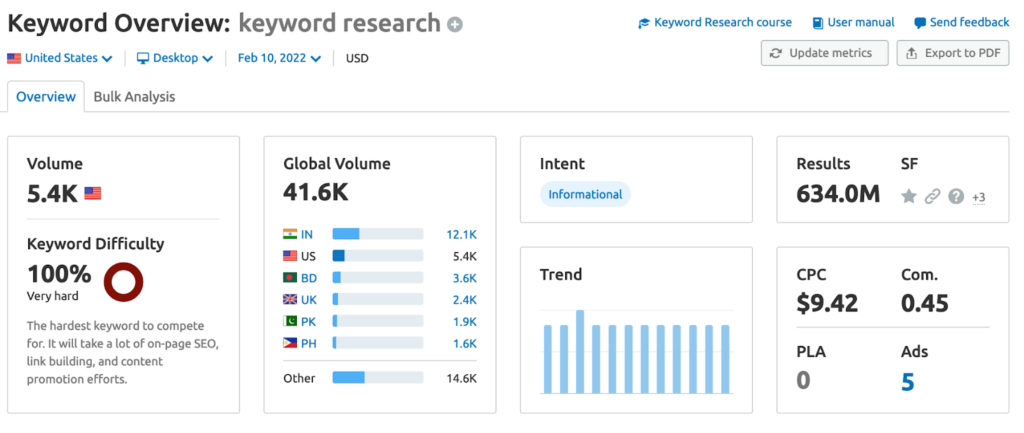
The underlying principle of keyword research is to determine what people want to read and then tailor your content to those issues. Additionally, certain keywords are more appropriate to target depending on the stage of the buyer’s journey that a customer is in.
Wondering how your site measures up? Well, you’re in luck! Simply email us here and we’ll send you a free, easy to read SEO report.
Interested in discussing on-page content development or website design with the North Star team? Great! Get started here to schedule your free consultation.





